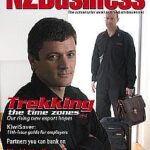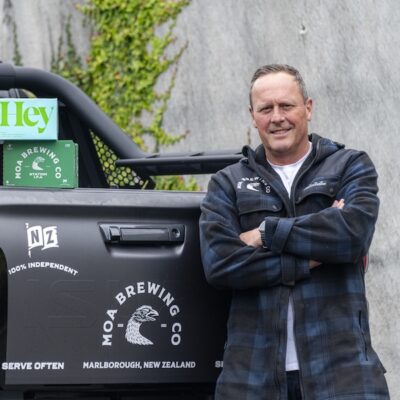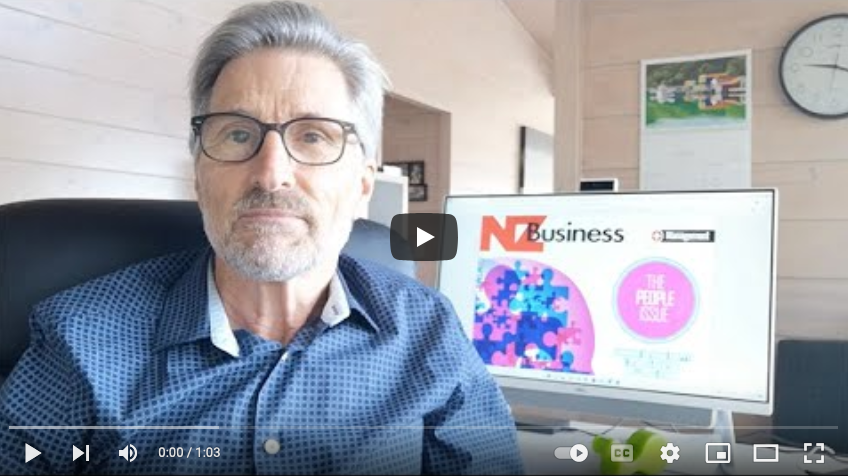Working Wirelessly
Wireless technologies are now secure and capable of revolutionising the way small businesses operate. Vikki Bland talks to two businesses that are making wireless technologies work for them to deliver immediate benefits.
Two small businesses that have revolutionised the way they operate by using different wireless technology products and services are now reaping the benefits, and are keen to share what they have learned.
Kimball Fink-Jensen is principal of business information and analysis business, Resolve, one of a small number of companies under the umbrella of parent company Traffic. Traffic helps companies develop and execute new growth strategies, something it knows a bit about – in four years the Auckland-based business with a national reach has expanded from four people to 30.
Fink-Jensen says a number of staff travel throughout the country on a regular basis, making remote wireless communication services and devices vital to business flow. Traffic also relies on wireless technologies within the office, running a ‘virtual PABX’ wireless telephony solution from Vodafone which uses the cellular mobile network for internal calling as well as mobile calling in other locations.
Traffic is also trialling a new call transfer service from Vodafone that allows the receptionist to transfer calls using her mobile phone. Internal calls are transferred in the same way.
“All our telecommunications run across the cellular network – our receptionist even uses a mobile phone to answer and divert calls,” says Fink-Jensen.
While higher call volumes would soon render this frontline telephony solution problematic, Fink-Jensen says it works perfectly for Traffic’s normal call volumes. And while there have been voice-quality issues over the cellular network, he says these are “transient and not detrimental to our business.”
On the cost front, Traffic pays for add-ons to Vodafone’s Talk Zone Zero plan – for example, the business purchased extra ‘frequently called numbers’ for an extra $8 per month each, which Fink-Jensen says saved Traffic $500 per month. A subsequent text and off-peak plan from Vodafone saved the business a further $500 per month.
Traffic staff use work mobile phones for personal calls, but Fink-Jensen says he has yet to see a bill for extreme personal use because most people have a home phone line. The few heavy personal mobile phone users the business has maintain a second mobile phone and Traffic uses call monitoring and tracking software from Vodafone to keep an eye on call usage.
The second small business successfully utilising wireless technology, physiotherapy company Physio Rehab Group, specialises in the treatment of high performance athletes and artists. It has seven Auckland clinics along with satellite clinics at Mt Ruapehu to cover the ski season. The Group works onsite with the medical team at the skifield and provides physiotherapy support for speed and freestyle ski teams.
Physio Rehab Group physiotherapists also tour on assignment throughout New Zealand and overseas. Using wireless technologies to connect physiotherapists to the right patient and company information is therefore considered business critical. Towards this, the Group uses a Telecom Mobile Broadband solution to securely access patient information from ski slopes, rugby fields, or backstage at ballet performances.
“Our clients can range from the Samoan Sevens to a French ballet company to an international rock band – essentially anyone who is doing something physically demanding,” says Karen Sutton, Physio Rehab Group chief executive.
She says using wireless technologies has increased efficiency and achieved a competitive edge for the business. With the ski season fast approaching the Group’s physiotherapists will be able to use wireless technologies to more efficiently treat injured skiers by accessing the central business network to view patient records and see the injuries and treatments an individual has had previously.
“This means we can be more effective in our how we treat them and what we recommend,” says .
Network niceties
Like many small businesses, Traffic has no dedicated IT manager and uses Maclean Computing for network and performance management and implementation of new applications. Traffic’s computers consist of PCs and Apple Macs, which Fink-Jensen says have integrated file sharing and email but can be otherwise problematic to integrate.
“We’ve done our best to bring the Macs into the loop as far as possible,” he says.
Traffic has three servers running communication and administration applications including Microsoft Office, project and workflow management tools, and server communication applications like Microsoft Exchange Server and BlackBerry Enterprise Server.
A wired telecommunications service from TelstraClear provides around 2Mbps of bandwidth and Internet access for Traffic’s internal data network.
Fink-Jensen says the move to a new building, coupled with the fact that Traffic has no branch offices, meant moving to a wireless platform for internal voice telephony was more cost effective and efficient, and there was little or no advantage in spending money upgrading the data network to run a Voice over IP (VoIP) solution. However, he says while Traffic doesn’t run video applications, it does have a need for video streaming within its advertising business.
“Video [and over what networks] is something we are getting our heads around,” says Fink-Jensen.
In addition to fixed lines from TelstraClear and the cellular mobile solution provided by Vodafone, Traffic also has one wireless access point, based on 802.11 (‘WiFi’) technologies. This supports Traffic’s Mac computers and creates a secure wireless extension to the main business network and out to the Internet.
Fink-Jensen says wireless technologies support the business goal of flexibility and ease of access to the business network, so employees working remotely with clients or from home can access the Traffic data network securely via Virtual Private Network (VPN) access across any online connection.
Like Traffic, mobile security is highly business critical to Physio Rehab Group, which needs to transmit and exchange patient information over mobile networks.
“We know that information is secure because it’s saved on our central server rather than us having to carry paper files. That’s really reassuring when you’re travelling with a team. It means our [people have] access to the latest patient notes which they can update
on the spot, they can complete ACC forms and lodge them, and they can also email doctors or specialists to make patient referrals,” says Sutton.
Device decisions
Ideally, mobile device decisions are based around the software that supports them from the server or ISP end, as well as specific device features and user preference. However, although Traffic runs Microsoft Exchange Server which can directly support smart phones running the Windows Mobile operating system as well as laptops with desktop versions of Windows, Fink-Jensen says Traffic prefers a mix of Blackberry smart phone devices supported by Blackberry Enterprise and Microsoft Exchange Server software, ‘voice only’ mobile phones, and laptops running Windows.
“Blackberry is a purpose built solution for instant communications and major information exchange, and it integrates well with Microsoft Outlook for calendar appointments, tasks and memos. So our project managers can create project plans and view and update the calendars of others, even while they may be away from the office or off sick,” says Fink-Jensen.
Each mobile Traffic employee has a laptop with 802.11 technologies on board for access to WiFi networks and cellular data cards to access the Vodafone 3G network. Alternatively, employees can connect via their home fixed line Internet access or the Internet access points provided in hotels, client offices or conference venues.
On the smart phone front, Fink-Jensen says Traffic is not zealous towards any particular device and would consider the Windows Mobile platforms if the business case was clear.
“People around here just want to be efficient and effective; so if in six months time we moved to another [smart phone] platform, our people will simply adjust. Windows Mobile is designed to be a mini Windows equivalent which is great, but it’s more than we need at the moment,” says Fink-Jensen.
Traffic uses HP and Toshiba laptops (the leading laptop brands in New Zealand) along with Dell and Lenovo. While new laptop features like built in 3G chipsets (which negate the need for a separate mobile card) appeal to many businesses, Fink-Jensen says dual core processors and security features including chipsets and biometric security features are top of mind for Traffic.
“When you rely a lot on mobile technologies, security is everything. We are still running Windows XP [even on new laptops]; we don’t implement a new operating system until we believe it is stable.”
Traffic pays $50 per Blackberry 7130 device per month for access to Blackberry services and Fink-Jensen says while Vodadone has 1GB of mobile data for around $49 per mobile network user, Traffic users only get through around a third of that. Mobile data costs
are manageable as Traffic
primarily exchanges small data files like email.
“Compare this to home Internet access where people access YouTube and Podcasts as an efficient way of keeping up to date. I use around 3GB per month from home on my Woosh plan, which is 5GB,” says Fink-Jensen.
As for those wireless benefits, Fink-Jensen says communication is the key to Traffic’s business, and Traffic needs instant communications.
“We are still a smallish business and our decision makers need to be abreast of what is going on across various projects. Project managers often work from home and need to be able to keep up with people and so project management, communication, and ease of decision making is business critical for us,” he says.
Wireless efficiency
Meanwhile, back at Physio Rehab Group, Sutton says wireless technologies support the company’s goal of providing physiotherapists travelling or working at satellite clinics a secure link to the Group’s central computer network. She says wireless technologies have also given Physio Rehab Group the option to look into new business opportunities outside its normal clinics and provided the team with opportunities to work in challenging and interesting areas – which helps with staff recruitment and retainment.
“We are more efficient which makes the whole process less painful for the injured people we see, and it can also cut up to three hours a day off paperwork when we get back to the office,” says Sutton.
In a five-day working week, that’s 15 hours saved. Put this together with Traffic’s $1000 per month telecommunications saving, and it’s easy to conclude that wireless technologies, carefully thought through and intelligently implemented, have the potential to deliver small businesses major benefits – including a competitive edge against larger and same-size businesses, and greater businesses efficiencies and savings. NZB
Vikki Bland is an Auckland-based specialist IT writer.
Email [email protected]






